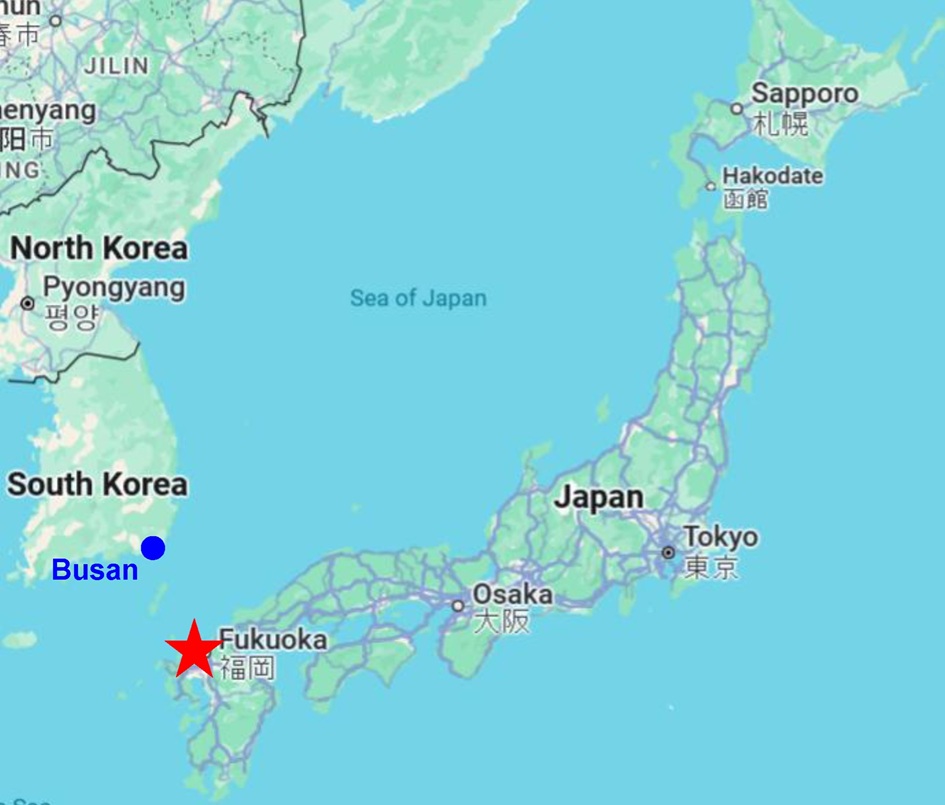International Workshop “Mid-latitude Atmosphere-Ocean-Ecosystem Interactions: Processes, Predictability, and Habitability”
Date: 16(Web) – 18(Fri) July, 2025
Venue: Shiiki Hall (location) in Ito campus of Kyushu Univ., Fukuoka, Japan
Host: “Habitable Japan” project
Program: Click here.
Abstract Book (password required): Click here.
Information for the participants: Click here.
The 5th circular is available here (17 June).
The workshop successfully ended. Thank you for your participation (Group photo).
Important Dates:
- 20 January, 2025: Abstract submission and registration open
- 31 March, 2025: Abstract submission close
- 30 April, 2025: Registration close (for those who need visa to enter Japan)
- 31 May, 2025: Program open
- 13 June, 2025: Registration close

Overview
In Japan, ocean warming has increased the frequency of weather disasters, while recent anomalies in ocean currents, such as retreat of the Oyashio to the north, Kuroshio large meander for the longest period observed, and northward shift of the Kuroshio Extension, have caused extreme hot summers and greatly affected fisheries. Needless to say, such variations and changes are not governed only by local dynamics but influenced by (and also influence) global climate. To answer the question: “Will mild climate and abundant water/fisheries resources persist as a basis of survival for those of us living in Japan in the future?”, we started a 5-year project “Habitable Japan” (FY2024–28) in April 2024. This project is also called “Climatic Hotspot3” because it is a successor of Hotspot1 (FY2010–14) and Hotspot2 (FY2019–23) projects, in which we investigated mid-latitude air-sea interaction and its change under global warming. In the new Habitable Japan project, to answer the above question, we have expanded our target domain to atmosphere/ocean chemistry, marine ecosystems, and fisheries. In this international workshop, we aim to exchange the latest information on mid-latitude atmosphere-ocean-ecosystem interactions, not only for the western North Pacific but also for other areas, and their relation to global climate. The workshop will be held just before the IAMAS-IACS-IAPSO Joint Assembly (BACO-25) on Jul 20–25 in Busan, Rep. of Korea, which is only 200km apart from Fukuoka.
Style of the workshop:
- 3-day open workshop with about 25 oral presentations and poster presentations
- No fee for the abstract submission and registration
- Reception on the 1st day and group receptions on the 2nd day
Confirmed Invited Speakers:
- Seth Bushinsky, Univ. of Hawaii at Manoa, USA
- Bieito Fernández Castro, Univ. of Southampton, UK
- Hyung-Gyu Lim, KIOST, Rep. Korea
- Bo Qiu, Univ. of Hawaii at Manoa, USA
- Seok-Woo Son, Seoul National Univ., Rep. Korea
- Thomas Spengler, Univ. of Bergen, Norway
- Andrea Storto, National Research Council of Italy, Italy
- Haiyan Teng, North Carolina Institute for Climate Studies, USA
- Qiang Wang, Hohai Univ., China
Science Organizing Committee:
- Samantha Hallam, Maynooth Univ., Ireland
- Hakase Hayashida, JAMSTEC, Japan
- Yoko Iwamoto, Hiroshima Univ., Japan
- Taketoshi Kodama, Univ. of Tokyo, Japan
- Hyung-Gyu Lim, KIOST, Rep. Korea
- Takashi Mochizuki, Kyushu Univ, Japan
- Masami Nonaka, JAMSTEC, Japan
- Yumiko Obayashi, Ehime Univ., Japan
- Eitarou Oka, Univ. of Tokyo, Japan
- Bo Qiu, Univ. of Hawaii at Manoa, USA
- Thomas Spengler, Univ. of Bergen, Norway
- Hiroki Tokinaga, Kyushu Univ., Japan
Transportation/Accommodation:
- Fukuoka city has an international/domestic airport very close (10 min. train) to the city center
- From Tokyo to Fukuoka, it takes 2 hours by flight or 5 hours by Shinkansen bullet train
- The venue at the Ito campus of Kyushu University is 1 hour from the Fukuoka city center by train/bus. There are many options for hotels and restaurants in the city center. (Note: participants need to book hotels by themselves.)
- From Fukuoka to Busan, it takes 1 hour by flight or 6 hours by ferry (Dep: 00:30pm, Arr: 06:30pm)
Travel Support:
There will be travel support of about USD1,000-1,500 per person for a few early-career (students or up to 10 years post-degree) scientists based in developing countries (defined here), sponsored by SCOR. If you like to receive this travel support, please apply in the registration form. The Science Organizing Committee will be selecting the recipients after the abstract submission deadline on March 31.
Excursion: Watching Baseball Game
There will be a baseball game of Fukuoka Softbank Hawks against Chiba Lotte Marines at PayPay Stadium on July 15 (the game starts at 06:00pm), the day before the workshop. The early-career representatives of Habitable Japan (ECHOES) are organizing to buy the tickets as a group at a discounted rate. This will be a great opportunity to meet the workshop participants and enjoy the ball game together. If you are interested in this event, please fill in this survey by Feb 3. We will contact all workshop participants for further information sometime in April.
Contact:
If you have questions, please email to habitablejapaniw25(at)gmail.com
